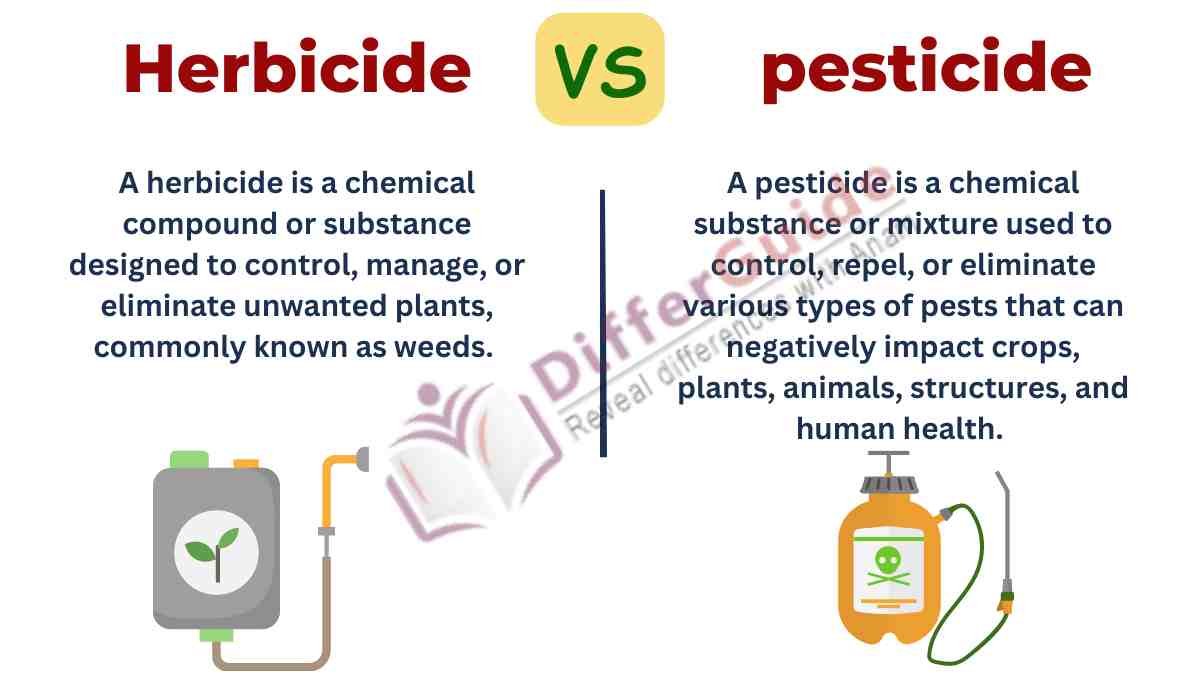The key difference between herbicides and pesticides is that herbicides target and control unwanted plants, while pesticides encompass a broader range of substances targeting various pests, including insects, fungi, and weeds.

What are Herbicides?
A herbicide is a chemical compound or substance designed to control, manage, or eliminate unwanted plants, commonly known as weeds. These chemicals are used in agriculture, gardening, landscaping, and various other settings to prevent the growth and spread of plants that can compete with desired crops or vegetation.
Herbicides work by interfering with the metabolic processes of plants, disrupting their growth, development, and reproduction. They can be applied to the soil, sprayed onto plant foliage, or introduced into water sources to target unwanted vegetation. It’s important to use herbicides carefully to minimize potential impacts on non-target plants and the environment, and to follow safety guidelines for proper handling and application.
What are Pesticides?
A pesticide is a chemical substance or mixture used to control, repel, or eliminate various types of pests that can negatively impact crops, plants, animals, structures, and human health.
Pests targeted by pesticides include insects, rodents, fungi, weeds, nematodes, mollusks (such as snails and slugs), and other organisms that can cause damage or pose a threat to agricultural, environmental, or public health systems.
Pesticides are designed to interfere with the normal physiological or behavioral processes of these pests, ultimately reducing their populations and minimizing the damage they cause. They can be applied through various methods, including spraying, dusting, baiting, and seed treatment.
While pesticides offer benefits in terms of protecting crops, controlling disease vectors, and managing public health risks, their use requires careful consideration due to potential environmental and health impacts.
Herbicides vs Pesticides
The main difference between herbicides and pesticides is given below:
| Herbicides | Pesticides | |
| Definition | Chemical substances are used to control, repel, or eliminate pests, including insects, weeds fungi, and other organisms. | Chemical substances used to control, repel, or eliminate pests, including insects, weeds fungi, and other organisms. |
| Target | Target primarily weeds and unwanted vegetation. | Targets a wider range of pests, including insects, rodents, fungi, weeds, and more. |
| Function | Designed to inhibit weed growth and disrupt their metabolic processes. | Designed to manage various types of pests by affecting their behavior, growth, or survival. |
| Types | Selective Herbicides: Target specific types of weeds without harming desired plants. Non-selective Herbicides: Kill or damage a wide range of plants | Insecticides: Target insects. Fungicides: Target fungi Rodenticides: Target rodents. Nematicides: Target nematodes. |
| Application | Applied to soil, foliage, or water where weeds are present or expected to grow. | Applied through various methods, including spraying, dusting, baiting, or seed treatment. |
| Environmental Impact* | If not used carefully, can impact non-target plants, wildlife, and ecosystems. | Can have non-target effects on other organisms and ecosystems, affecting biodiversity. |
| Health Impact | Herbicide exposure can have health effects on humans and animals, necessitating proper handling and use. | Pesticide exposure can lead to health issues in humans and animals, requiring careful handling and adherence to safety guidelines. |
| Examples | Glyphosate (Roundup), 2,4-D, Atrazine, Paraquat. | Pyrethroids, Neonicotinoids, Organophosphates, Carbamates, DDT. |
